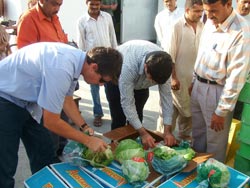
New research paves the way for fresh veggie exports to distant markets

Anthony Staatz (Koala Farms, Gatton) and
Hamid Ghaedi (Ghulam Ali Abdulla Trading) assess
the quality of Australian vegetables on arrival in Dubai.
The NSW Government today said new research could potentially open opportunities for exporting fresh vegetables to the Middle East and other distant markets.
A recent research project carried out by the NSW Department of Primary Industries looked at various shipping methods for sending fresh vegetables to Dubai.
Australia currently exports around $1 million worth of cauliflower, broccoli and lettuce to the Middle East, but the market could potentially be worth more than $5 million to local growers.
Only small amounts of vegetables from NSW have been sent to the Dubai market to-date, primarily via air transport.
Most exporters assume that sending vegetables via sea transport is too long of a trip for the products to arrive in marketable condition.
However, researchers from the NSW Department of Primary Industries found that sea freight is a viable option for exporting fresh vegetables to Dubai.
These findings could open doors for Australian horticulture exports to distant markets and potentially lead to extra income for growers, as there is strong demand for Australian produce during our winter months, which is the off-season for produce grown in the northern hemisphere.
According to DPI Research Horticulturist Jenny Ekman, this recent study should provide exporters with more confidence in alternative shipping methods.
'It is usually recommended that broccoli, cauliflower and lettuce be stored for no more than 14 days, 4 weeks and 3 weeks respectively,' Ms Ekman said.
'However, scientists at the DPI’s Gosford Horticultural Institute have carried out trials confirming that storage times for these items can increase to 4-5 weeks, without negatively impacting quality and shelf life.
'Our commercial scale research involved testing different harvesting methods, different types of shipping containers, and different packaging and modified atmosphere techniques.
'Teams sent one standard and one modified-atmosphere container of fresh vegetables to Dubai from Brisbane to test the various technologies.
'The quality of the products was then assessed on arrival in Dubai by a team of Australian growers, scientists and the exporter.
'Teams found results and buyer response were good news for the Australian horticulture industry.
'Shipping times from Australia’s east coast are now down to 23 days, and new shipping technology demonstrates product can be delivered confidently by sea.'
An extension and expansion of this project has been supported by the Australian vegetable industry and DPI researchers hope to repeat this work using different vegetables, other types of shipping container and possibly other, more distant markets (such as Europe).
The research project was funded by Horticulture Australia Limited (HAL) and from growers’ levies.
Media contact: Joanne Finlay on 02 6391 3171.
Email:

